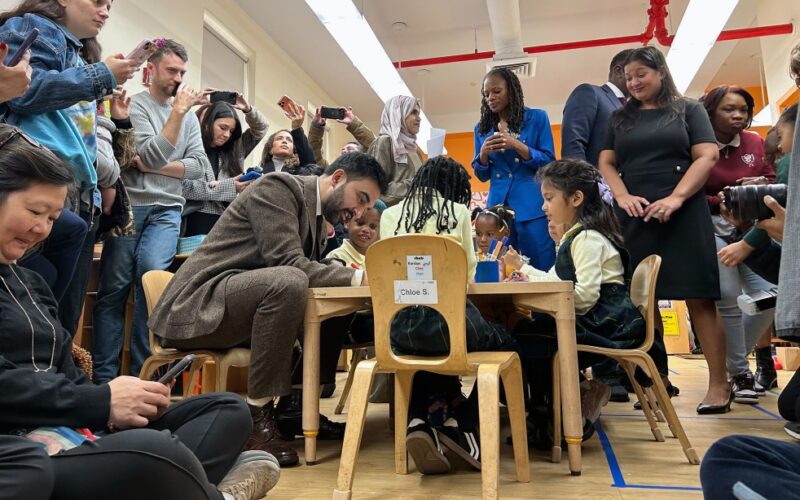The City Council on Thursday endorsed Mayor-elect Zohran Mamdani’s call for the state to pony up more money for childcare programs in the Big Apple — and laid out a series of suggestions for how he could make the system as a whole more effective.
The Council, under the leadership of outgoing Speaker Adrienne Adams, unveiled its reasoning in a 14-page report that could also serve as a roadmap for Mamdani next year as he seeks to make good on his campaign promise to usher in free childcare for all city kids between the ages of six weeks and 5.
Currently, only families of 3 and 4-year-olds qualify for universal childcare programs in the city, and Mamdani’s campaign says the expansion he envisions would cost an additional $6 billion every year.
Mamdani has said the state should provide that funding, specifically by increasing taxes on millionaires and corporations in the city — a proposal that’s already running into headwinds in Albany.
In its new report, a copy of which was obtained by the Daily News ahead of its release, the Council sided with Mamdani’s demand for more state childcare cash, but stopped short of saying the money should be raised through tax hikes.
“To provide the city’s families with expanded access to affordable early childhood education, the state budget must commit far greater funding support, whether through budget and/or tax policy changes enacted by the governor and state legislature,” says the report.
The document doesn’t specify a figure for how much more money the state should provide, but a Council official told The News the speaker agrees with Mamdani that it should be in the “billions.”
The speaker, who ran against Mamdani in June’s Democratic mayoral primary, is leaving office at the end of the year due to term limits. But the leading candidates running to succeed her as speaker, Brooklyn Councilwoman Crystal Hudson and Manhattan Councilwoman Julie Menin, are largely supportive of Mamdani’s push for universal childcare.
Besides echoing Mamdani’s demand for more state funding, the new Council report says his administration must immediately get to work on reforming the ways in which the city contracts with private childcare providers.
The main contract for the Department of Education’s childcare programs is set to expire in July 2026, and the Council report goes into detail in saying that moment “presents a pivotal opportunity” for the incoming Mamdani administration to remove kinks in the existing system.
Opportunities and obstacles
For instance, the report says the city’s new Request for Proposal, a template for how the program would be structured, should standardize a way to provide free “extended day” childcare seats for low-income families. Such seats provide childcare for up to 10 hours per day, year-around — above the traditional 6 hours and 20 minutes per day, 10 months per year currently subsidized by the universal 3K and pre-K programs.
Low-income families, in particular, are often in need of keeping their children at daycares for longer hours. The Council report says that can be accomplished by creating “a sliding scale family share structure” under which families earning more would pay “modest” fees for extended day seats in order to make sure those on the lower end of the income ladder can get theirs fully subsidized.
Barry Williams / New York Daily News
New York City Council Speaker Adrienne Adams. (Barry Williams / New York Daily News)
The Council report also says the new RFP should increase the number of seats for children with disabilities, ensure parents can apply for seats on site at a daycare as opposed to only doing it via an online portal and standardize wages for all city-contracted childcare professionals — a proposal that would likely result in higher overall costs.
Additionally, the document says the new RFP should “streamline overlapping or contradictory procedures” that currently exist because of the childcare enrollment process involving a number of different agencies beyond the Department of Education, including the Administration for Children’s Services. The report doesn’t specify exactly how such streamlining would be done.
A Mamdani spokeswoman didn’t immediately return a request for comment on the Council report.
Once he’s sworn in Jan. 1, Mamdani, 34, will face serious obstacles in how to secure the childcare funding he’s seeking.
Gov. Hochul, whose support will all but certainly be required to unlock more state funding, has said she’s against raising taxes next year, while President Trump has threatened to cut various federal funding for the city once Mamdani’s mayor.
Hochul, though, has said she supports Mamdani’s overall push to make free childcare more accessible, potentially by tapping a different funding stream. It remains unclear what that funding stream might be.
While touring a childcare center in Brooklyn’s Crown Heights neighborhood on Thursday, Mamdani told reporters the most important thing for him is to provide more childcare, not the method by which an expansion is funded. He also shied away from giving himself a firm deadline by which he needs to make meaningful progress on providing more childcare.
“I view the time that I will be the mayor as the time that we have to implement the policies that we ran on,” said Mamdani. That give him four years, unless he’s re-elected to a second term.
With Cayla Bamberger








